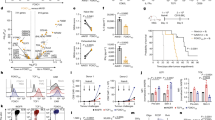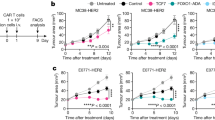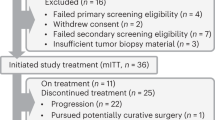Abstract
Recognition of neoantigens that are formed as a consequence of DNA damage is likely to form a major driving force behind the clinical activity of cancer immunotherapies such as T-cell checkpoint blockade and adoptive T-cell therapy1,2,3,4,5,6,7. Therefore, strategies to selectively enhance T-cell reactivity against genetically defined neoantigens1,8,9,10,11 are currently under development. In mouse models, T-cell pressure can sculpt the antigenicity of tumours, resulting in the emergence of tumours that lack defined mutant antigens12,13. However, whether the T-cell-recognized neoantigen repertoire in human cancers is constant over time is unclear. Here we analyse the stability of neoantigen-specific T-cell responses and the antigens they recognize in two patients with stage IV melanoma treated by adoptive T-cell transfer. The T-cell-recognized neoantigens can be selectively lost from the tumour cell population, either by overall reduced expression of the genes or loss of the mutant alleles. Notably, loss of expression of T-cell-recognized neoantigens was accompanied by development of neoantigen-specific T-cell reactivity in tumour-infiltrating lymphocytes. These data demonstrate the dynamic interactions between cancer cells and T cells, which suggest that T cells mediate neoantigen immunoediting, and indicate that the therapeutic induction of broad neoantigen-specific T-cell responses should be used to avoid tumour resistance.
This is a preview of subscription content, access via your institution
Access options
Subscribe to this journal
Receive 51 print issues and online access
$199.00 per year
only $3.90 per issue
Buy this article
- Purchase on Springer Link
- Instant access to full article PDF
Prices may be subject to local taxes which are calculated during checkout



Similar content being viewed by others
References
Gubin, M. M. et al. Checkpoint blockade cancer immunotherapy targets tumour-specific mutant antigens. Nature 515, 577–581 (2014)
Le, D. T. et al. PD-1 blockade in tumors with mismatch-repair deficiency. N. Engl. J. Med. 372, 2509–2520 (2015)
Linnemann, C. et al. High-throughput epitope discovery reveals frequent recognition of neo-antigens by CD4+ T cells in human melanoma. Nat. Med. 21, 81–85 (2015)
Rizvi, N. A. et al. Cancer immunology. Mutational landscape determines sensitivity to PD-1 blockade in non-small cell lung cancer. Science 348, 124–128 (2015)
Robbins, P. F. et al. Mining exomic sequencing data to identify mutated antigens recognized by adoptively transferred tumor-reactive T cells. Nat. Med. 19, 747–752 (2013)
Van Allen, E. M. et al. Genomic correlates of response to CTLA-4 blockade in metastatic melanoma. Science 350, 207–211 (2015)
van Rooij, N. et al. Tumor exome analysis reveals neoantigen-specific T-cell reactivity in an ipilimumab-responsive melanoma. J. Clin. Oncol. 31, e439–e442 (2013)
Carreno, B. M. et al. Cancer immunotherapy. A dendritic cell vaccine increases the breadth and diversity of melanoma neoantigen-specific T cells. Science 348, 803–808 (2015)
Kreiter, S. et al. Mutant MHC class II epitopes drive therapeutic immune responses to cancer. Nature 520, 692–696 (2015)
Schumacher, T. N. & Schreiber, R. D. Neoantigens in cancer immunotherapy. Science 348, 69–74 (2015)
Tran, E. et al. Cancer immunotherapy based on mutation-specific CD4+ T cells in a patient with epithelial cancer. Science 344, 641–645 (2014)
Matsushita, H. et al. Cancer exome analysis reveals a T-cell-dependent mechanism of cancer immunoediting. Nature 482, 400–404 (2012)
Mittal, D., Gubin, M. M., Schreiber, R. D. & Smyth, M. J. New insights into cancer immunoediting and its three component phases—elimination, equilibrium and escape. Curr. Opin. Immunol. 27, 16–25 (2014)
Andersen, R. S. et al. Dissection of T-cell antigen specificity in human melanoma. Cancer Res. 72, 1642–1650 (2012)
Kawakami, Y. et al. Recognition of shared melanoma antigens in association with major HLA-A alleles by tumor infiltrating T lymphocytes from 123 patients with melanoma. J. Immunother. 23, 17–27 (2000)
Lu, Y. C. et al. Efficient identification of mutated cancer antigens recognized by T cells associated with durable tumor regressions. Clin. Cancer Res. 20, 3401–3410 (2014)
Sharma, P. & Allison, J. P. The future of immune checkpoint therapy. Science 348, 56–61 (2015)
Besser, M. J. et al. Clinical responses in a phase II study using adoptive transfer of short-term cultured tumor infiltration lymphocytes in metastatic melanoma patients. Clin. Cancer Res. 16, 2646–2655 (2010)
Dudley, M. E. et al. Adoptive cell therapy for patients with metastatic melanoma: evaluation of intensive myeloablative chemoradiation preparative regimens. J. Clin. Oncol. 26, 5233–5239 (2008)
Ellebaek, E. et al. Adoptive cell therapy with autologous tumor infiltrating lymphocytes and low-dose interleukin-2 in metastatic melanoma patients. J. Transl. Med. 10, 169–180 (2012)
Tran, E. et al. Immunogenicity of somatic mutations in human gastrointestinal cancers. Science 350, 1387–1390 (2015)
Gros, A. et al. PD-1 identifies the patient-specific CD8+ tumor-reactive repertoire infiltrating human tumors. J. Clin. Invest. 124, 2246–2259 (2014)
Verdegaal, E. M. et al. Successful treatment of metastatic melanoma by adoptive transfer of blood-derived polyclonal tumor-specific CD4+ and CD8+ T cells in combination with low-dose interferon-alpha. Cancer Immunol. Immunother. 60, 953–963 (2011)
Hadrup, S. R. et al. Parallel detection of antigen-specific T-cell responses by multidimensional encoding of MHC multimers. Nat. Methods 6, 520–526 (2009)
Kwakkenbos, M. J. et al. Generation of stable monoclonal antibody-producing B cell receptor-positive human memory B cells by genetic programming. Nat. Med. 16, 123–128 (2010)
Wolchok, J. D. et al. Guidelines for the evaluation of immune therapy activity in solid tumors: immune-related response criteria. Clin. Cancer Res. 15, 7412–7420 (2009)
Krauthammer, M. et al. Exome sequencing identifies recurrent somatic RAC1 mutations in melanoma. Nat. Genet. 44, 1006–1014 (2012)
Timm, J. & Walker, C. M. Mutational escape of CD8+ T cell epitopes: implications for prevention and therapy of persistent hepatitis virus infections. Med. Microbiol. Immunol. 204, 29–38 (2015)
Gerlinger, M. et al. Intratumor heterogeneity and branched evolution revealed by multiregion sequencing. N. Engl. J. Med. 366, 883–892 (2012)
Acknowledgements
We are grateful to G. J. Liefers for handling of patient material, and T. van Wezel and D. Ruano for the setup of the M13-amplicon sequencing technology. This work was supported by Dutch Cancer Society grant UL 2012-5544 (to E.M.E.V., S.H.v.d.B. and J.B.A.G.H), the Anticancer Fund (to E.M.E.V. and S.H.v.d.B.), Dutch Cancer Society grant NKI 2012-5463 (to T.N.S, J.B.A.G.H. and S.H.v.d.B), the Dutch Cancer Society Queen Wilhelmina Award NKI 2013-6122 (T.N.S), Dutch Cancer Society grant UVA 2010-4822 (to H.S.), Fight Colorectal Cancer-Michael’s Mission-AACR Fellowship (2015) and Alpe d’HuZes/KWF Bas Mulder Award (to N.F.C.C.d.M.).
Author information
Authors and Affiliations
Contributions
E.M.E.V. designed, performed, analysed and interpreted experiments and wrote the paper, N.F.C.C.d.M., M.V., C.E.v.d.M. and T.H. designed, performed, analysed and interpreted the experiments, M.M.v.B. analysed and interpreted next-generation sequencing data and performed peptide selection, R.S.A. and S.R.H. designed, performed and interpreted the combinatorial coding experiments, R.S. generated BCL-6/BCL-XL immortalized B-cell lines. E.H.W.K and J.B.A.G.H. supervised treatment of patients, supplied patient material and provided clinical interpretation of results. H.S. developed the BCL-6/BCL-XL immortalization technology. T.N.S. interpreted the data and wrote the paper, S.H.v.d.B. supervised the project, designed and interpreted the experiments, and wrote the paper.
Corresponding author
Ethics declarations
Competing interests
AIMM Therapeutics holds IP to immortalize human B cells, and AIMM Therapeutics/ The Netherlands Cancer Institute hold IP for the use of immortalized human B cells to identify T cell epitopes. H.S. and R.S. are employees and stockholders of AIMM Therapeutics. T.N.S. is a scientific advisor and stockholder of AIMM Therapeutics.
Additional information
Reviewer Information
Nature thanks M. Gubin, U. Sahin and the other anonymous reviewer(s) for their contribution to the peer review of this work.
Rights and permissions
About this article
Cite this article
Verdegaal, E., de Miranda, N., Visser, M. et al. Neoantigen landscape dynamics during human melanoma–T cell interactions. Nature 536, 91–95 (2016). https://doi.org/10.1038/nature18945
Received:
Accepted:
Published:
Issue Date:
DOI: https://doi.org/10.1038/nature18945
This article is cited by
-
Tumor mutational burden predictability in head and neck squamous cell carcinoma patients treated with immunotherapy: systematic review and meta-analysis
Journal of Translational Medicine (2024)
-
Tumour-infiltrating lymphocyte therapy for patients with advanced-stage melanoma
Nature Reviews Clinical Oncology (2024)
-
Merkel Cell Carcinoma: Integrating Epidemiology, Immunology, and Therapeutic Updates
American Journal of Clinical Dermatology (2024)
-
Recent advances and future challenges of tumor vaccination therapy for recurrent glioblastoma
Cell Communication and Signaling (2023)
-
Comprehensive analysis of neoantigens derived from structural variation across whole genomes from 2528 tumors
Genome Biology (2023)
Comments
By submitting a comment you agree to abide by our Terms and Community Guidelines. If you find something abusive or that does not comply with our terms or guidelines please flag it as inappropriate.



